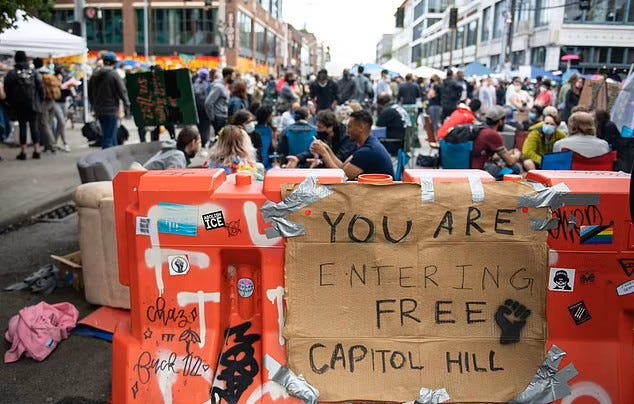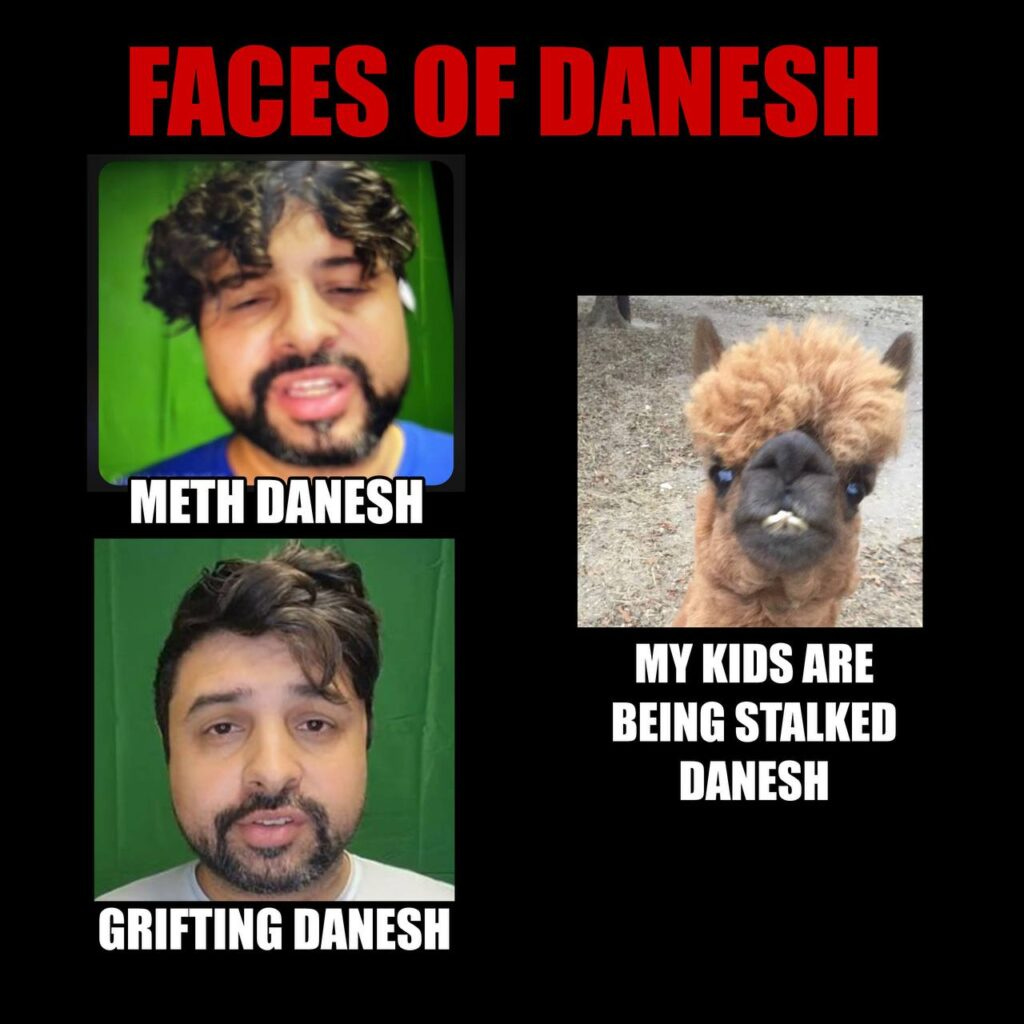Free Speech Rape Muzzle in Washington State, Will DARVO Tyranny Turn Violent?
Seattle Judges Silence Victims of Violence; Hand Trump Justification to Roll in Troops to Preserve Law and Order?

NOTE: This piece first appeared on FLGulfNews.com.
By M. Thomas Nast with Richard Luthmann
The Washington Court Case That Alarms Free‑Speech Advocates
BELLVUE, WASHINGTON, and FORT MYERS, FLORIDA - The case of Bobick v. Fernandes could rock Washington State in unprecedented ways. How? Blood on the courthouse steps and the deployment of federal troops to Seattle. It’s not a far stretch.
In December 2023, climber Stephen Bobick sought an anti-harassment protection order against a stranger who accused him of sexual assault. Bobick claimed that Melissa Fernandes had harassed him online for more than a year and made false claims that he sexually assaulted a woman in 2015.
Is Stephen Bobick a rapist? No court has ever said whether this is true or false. Melissa Fernandes believes it to be true, and aren’t sexual violence victims to be taken at face value? At least in deep blue Seattle?
For Bobick, it didn’t matter. He ran to Washington State Superior Court and cited two incidents: Fernandes launched a Change.org petition demanding that his climbing club change its vetting policies and included the statement that a former member reported two sexual assaults in 2016 and that “Stephen Bobick was accused of touching a woman inappropriately.”
She also co‑hosted public events where a video showed Bobick’s photo with the caption “Was sexually assaulted twice … by leaders in The Mountaineers I trusted,” and she rang a bell and shouted “shame” as the image flashed.
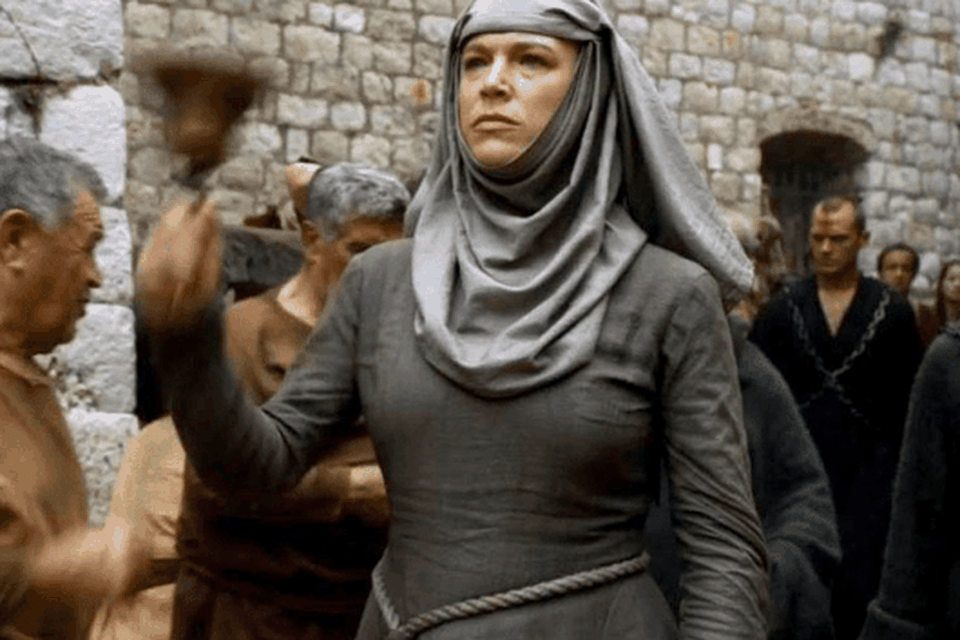
A superior‑court judge granted the protection order. The judge found that Fernandes wanted to make her accusations public to warn others, that Bobick provided a sworn declaration showing she made unproven accusations of sexual assault for over 12 months, and that her actions constituted harassment and were not protected free speech.
The appellate court affirmed, citing Washington law, which requires the issuance of an order when a “knowing and willful course of conduct” seriously alarms or harasses a person and serves no legitimate purpose.
The statute excludes “constitutionally protected activity,” but the judges held that Fernandes’s repeated online accusations of sexual assault—without a judicial finding that they were false—met the definition of harassment.
The ruling alarmed free‑speech advocates because it effectively imposed a gag order on accusations of sexual assault without requiring proof of falsity. As Judge Janet Chung wrote, the court believed there was “not an appropriate use of free speech,” which left critics wondering whether the First Amendment is suspended in Washington when allegations make someone uncomfortable.
Free Speech Rape Muzzle: The Limits of Antiharassment Orders
UCLA law professor Eugene Volokh quickly raised the alarm. In a blog post for Reason’s Volokh Conspiracy, he noted that the court’s decision allows antiharassment orders to silence accusations without a defamation trial. Volokh reminds readers that injunctions against libel are permissible only after a full trial and a finding that the statements are false and defamatory.
Anti‑harassment orders should not be used as a way to avoid the evidentiary burden required in defamation cases. He criticized the Washington court for allowing Bobick to obtain a speech-restricting order without proving the accusations to be false. Such a standard undermines the First Amendment’s protection of statements on matters of public concern.
Volokh noted that the Washington statute defines unlawful harassment as conduct that has no legitimate or lawful purpose and causes substantial emotional distress. Yet the law explicitly excludes “constitutionally protected activity.” In his view, accusing someone of sexual assault—however unpleasant—remains protected until a court finds the statements false. Preventing repetition of such statements through an antiharassment order effectively sidesteps the First Amendment and transforms unproven allegations into punishable speech.
Volokh’s analysis warns that this precedent could invite misuse. If courts can issue orders silencing public accusations without a defamation trial, powerful individuals may weaponize antiharassment laws to shield themselves from criticism.
Washington’s decision raises the specter of speech chilling. Critics fear that it encourages a legal arms race: if your reputation is threatened, simply label your critic a harasser and have a judge intervene to silence them.
Such a system invites abuse, particularly in the hands of those with resources to hire lawyers and spin a narrative.
Free Speech Rape Muzzle: DARVO, Digital Bullies and the New Censors
The Washington case comes amid growing concerns about DARVO—an acronym for Deny, Attack, and Reverse Victim and Offender. It is a tactic used by abusers to avoid responsibility and shift blame.
After being confronted, an abuser denies wrongdoing, attacks their accuser’s credibility with insults and threats, and then claims they are the real victim. This reversal often leaves victims doubting their own experience.
Family and domestic violence expert Jill Jones Soderman notes that by denying actions, attacking the person confronting them, and flipping the roles of victim and offender, narcissists redirect attention away from their abuse and cause doubt in the victim’s claims.
“The tactic inflicts severe mental harm; victims may internalize the false narrative and believe they are responsible for the abuse,” Soderman said.
DARVO doesn’t stay within domestic relationships. It plays out on social media, where mega-influencers build lucrative brands by shaming ordinary people and then cry victim when they are challenged.
Take Danesh Noshirvan, better known as TikTok’s @ThatDaneshGuy. Reports call him a “paid agitator” and “digital arsonist” who uses fake evidence, malicious claims, manufactured outrage, AI generation, and troll farms to burn reputations.

Danesh sues his victims, including Florida mom and businesswoman Jennifer Couture and her plastic surgeon husband, who say that Danesh’s activities are part of a pattern of bad-faith legal harassment and digital terror.
Now facing nearly $100,000 in sanctions in a federal defamation case, Danesh told the court he was a “man of modest means.” Yet his IRS Form 4562 showed he put $1.16 million in property into service with a threshold cost of $2.89 million.
“Danesh’s tax returns expose his poverty claim as a fabrication,” journalist Richard Luthmann says.
His deception doesn’t stop at tax filings. He once circulated a doctored Interpol arrest photo of a journalist to intimidate critics, barged into a deposition he was barred from attending, and delivered a profanity‑filled tirade, then falsely accused the Black civil‑rights lawyer he harassed of racism.
Fort Myers U.S. District Judge John E. Steele called the outburst “reprehensible.” He told the court he wasn’t a mega influencer despite boasting over 2.5 million followers.
According to one lawsuit, Noshirvan runs a fee‑for‑service cyberstalking enterprise with his millions of followers, enriching himself by humiliating victims and meting out consequences he deems appropriate.
Critics say he sues to smear, silence, and scare, using each violation as content to solicit donations.
In other words, he embodies DARVO: attack, play victim, then weaponize the legal system. And if he were to utilize a Washington State-style law in his arsenal of abuse, Danesh, who already has a body count, could become even more lethal.
Free Speech Rape Muzzle: The Jeremy Hales Horror Show
Another cautionary tale is Jeremy Hales, the YouTuber behind “WhatTheHales.” His imminent collapse is chronicled in an article titled Jeremy Hales in Freefall. Hales, a public figure with over 750,000 followers, has at least 19 pending federal court litigation matters in which he is suing individuals because he disagrees with their statements.
Court documents, psychological evaluations, and satire exposed a “dark truth” behind his persona: Jeremy Hales is a DARVO abuser. Hales signed a consent agreement in Ohio, barring him from contacting his daughter unless she initiated the contact. The order followed a damning emergency motion from his ex‑wife detailing emotional and physical abuse; their daughter’s therapist said contact with him was retraumatizing and harming her mental health.
The court “shut it down.”
Public records show Hales lashes out with lawsuits, threats, and conspiracies whenever his ego is bruised. He doesn’t litigate to win—he litigates to control. When independent journalists produced satire portraying him as a backwoods grifter or comparing him to notorious scumbag Andrew Tate, Hales called the creators criminals and threatened more lawsuits.
“Hales doesn’t do self‑reflection. He does rage. And he does it poorly with the aid of a scumbag lawyer named Randy Shochet,” journalist Richard Luthmann observed.
Hales also has a band of cyber criminal cultists he calls “the Muppets.” Hales has publicly admitted he orders these Muppets to perform digital attacks on his targets.
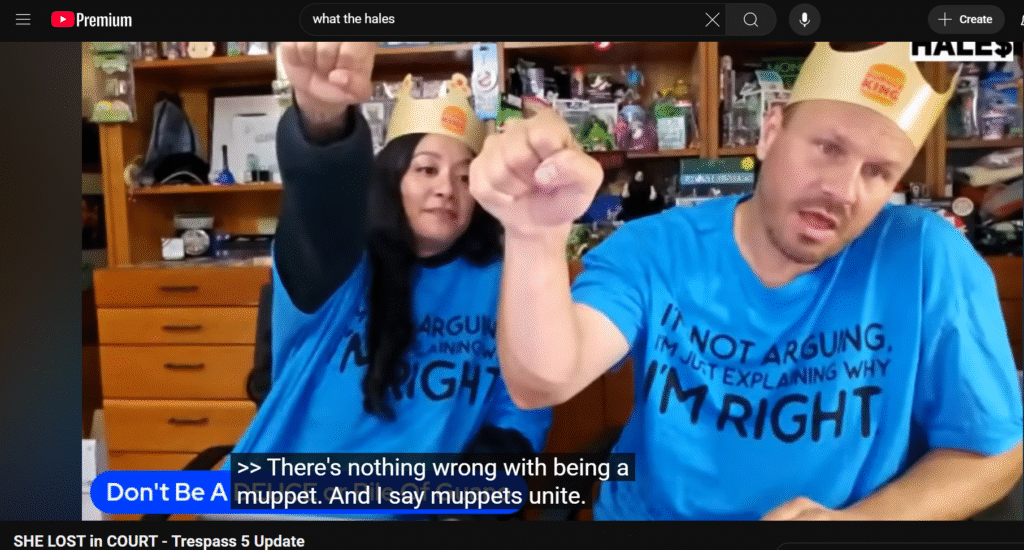
Even after a motion for summary judgment in one case revealed that he fabricated allegations, failed to prove damages, and violated basic procedural law, Hales doubled down on camera, delusionally denying the judicial decision.
“He spoon-feeds an older and very gullible audience a narrative that has little basis in reality. What he says is designed to solicit money from the elderly, and his actions smack of elder abuse,” Luthmann said.
In court, his filings were dismissed as “rhetorical hyperbole”; in family court, he was deemed unsafe for his own children. Yet on YouTube, he still begs for money and claims victory.
Hales built a media empire on lies, lawsuits, and rage. Now the truth is catching up. He lost his daughter, he’s losing his lawsuits, and his enablers are being sanctioned.

The pattern is familiar. Both Noshirvan and Hales weaponize the legal system while portraying themselves as victims. They attack critics, demand sympathy, and harness their followers as an army.
\When challenged, they sue.
Their victims are often ordinary people without the money or platform to fight back.
In the age of DARVO and digital mobbing, an antiharassment order like the one issued in Washington will become a silver bullet tool for abusers to silence dissent.
Free Speech Rape Muzzle: When Law Becomes Tyranny, What is the Answer?
The Founders’ favorite philosopher, John Locke, warned that a government that violates natural rights loses legitimacy. Locke argued that when leaders exceed their authority and violate the rights to life, liberty, or property, individuals have the right to dissent and rebel.
If a government fails to protect rights, reverting to a state of nature is preferable to living under a tyrant. Throughout history—during the American Revolution, the Indian independence movement, and the civil‑rights movement—dissent has checked tyranny.
Washington’s antiharassment ruling raises a chilling question: when free speech is throttled and abusers use the courts to silence victims, what recourse remains? If courts treat unproven allegations as harassment and grant gag orders without requiring proof, then the law itself becomes an instrument of abuse.
Victims facing doxxing, mob harassment, and false reporting might see the courthouse as a rigged game.
That anger bubbles. When DARVO abusers seek to muzzle critics with “antiharassment protection orders,” some may have the mistaken belief that, in a legal system that favors abusers, it’s time to turn the courthouse steps into the OK Corral.
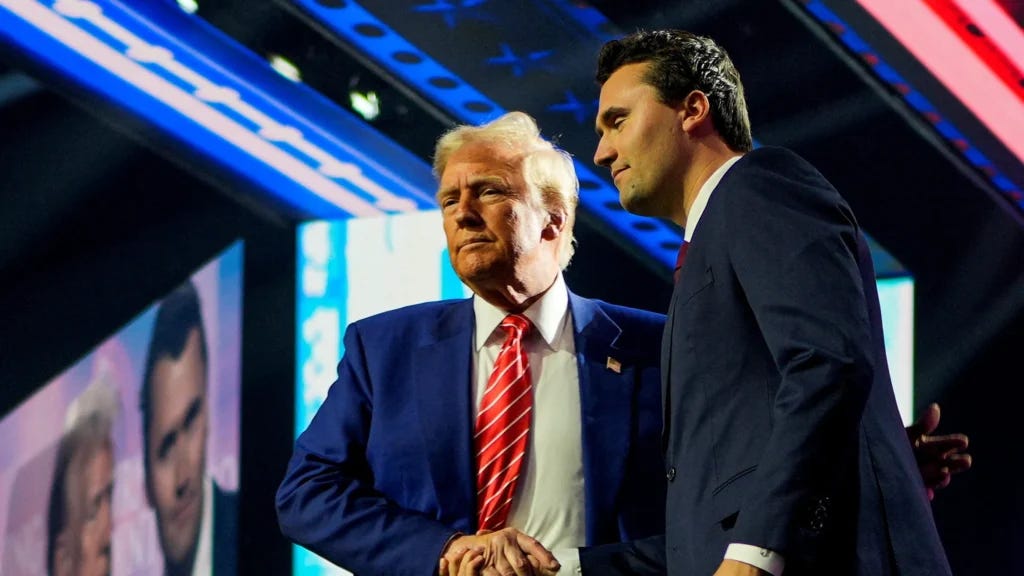
The rhetorical flourish aside, in the wake of the Charlie Kirk assassination, Americans are looking for answers. No one is calling for violence, but many fear that silencing speech breeds extremism. When lawful channels are closed, some people may feel they have no choice but to resist by any means.
Professor Volokh’s analysis, the psychological framework of DARVO, and the documented behavior of Noshirvan and Hales all point to a crisis.
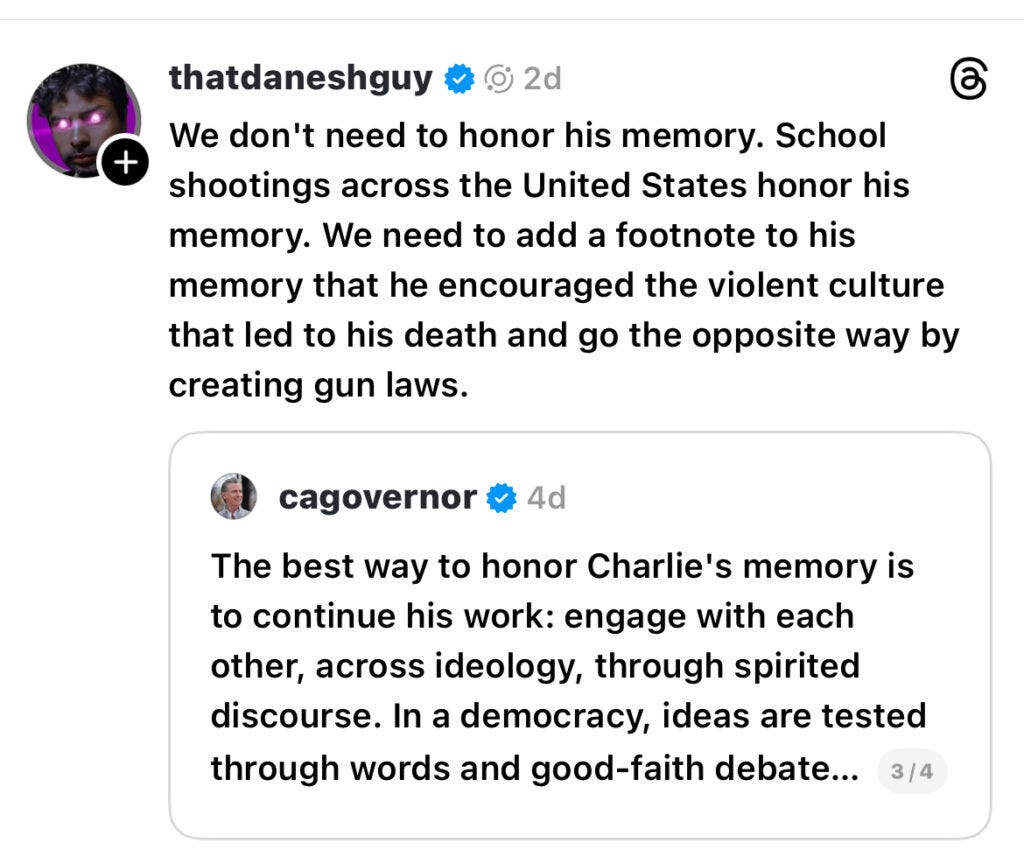
Mega‑influencers with armies of followers can DARVO their way into court, claim they’re being harassed, and obtain orders that gag their critics. Unless courts insist on defamation trials and protect speech until statements are proven false, the First Amendment is at risk.
In Locke’s terms, a government that suppresses speech becomes illegitimate. Citizens must decide whether to reclaim their rights through lawful dissent or face a future where bullies rule with court orders and trolls.
The Bobick ruling feels like the deep state’s latest assault on the First Amendment. It hands a judge the power to gag accusations without proving them false.
However, the federal system has a release valve in the form of dual state and federal oversight. Before we devolve into the war of all against all, the federal executive can act to protect the fundamental and inalienable rights of the sovereign people.
When a leader and First Amendment defender like President Trump sees what’s happening in Orem, Utah, Bellevue, Washington, and across the country, he is justified in concluding that to protect the rule of law, we must defend free speech as the foundation of our constitutional republic.
If local, radical, blue-state courts trash free speech while armies of bullies and abusers roam free and enlist crooked local court systems as their aides-de-camp, why shouldn’t the Commander‑in‑Chief send in troops to keep the peace?
President Trump promised to defend law and order. Now, Washington State’s radical woke maniac judges are making his case. They are handing him the perfect excuse to roll up and say, “Enough.”





